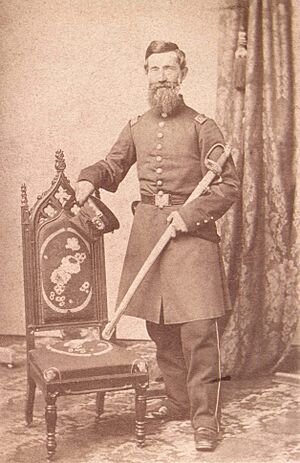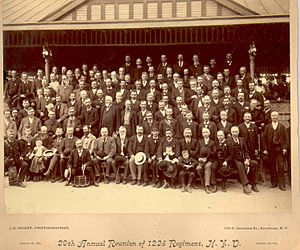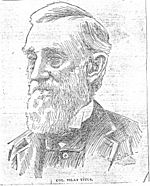Silas Titus facts for kids
Silas Titus (born May 30, 1811 – died October 4, 1899) was a brave military officer. He fought in the American Civil War for the Union Army. He also helped organize the city of Syracuse, New York. He served as a city leader for two years. He was also important in building the first 30 miles of continuous railroad in the United States.
Contents
Early Life and Big Ideas
Silas Titus was born on May 30, 1811, in Wolcott, New York. Sadly, his parents died when he was only three years old. His uncle, Platt Titus, took him to his farm in Cato, New York.
When Silas was 16, in 1827, he left the farm. He got a job as a clerk at a general store in Cato. He also became the Deputy Post Master there. He worked at the store until 1832. Then, with just $50, he moved to Detroit, Michigan, to find new work. He found success and started his own business in 1833.
Building the First Railroad
In 1835, Silas Titus traveled to New York City. On his trip, he saw the first railroad in New York. It ran from Schenectady to Albany. He was very impressed by this new technology! When he returned to Detroit, he organized a town meeting. The people agreed to build a railroad from Detroit to Ypsilanti, Michigan. Silas became one of the leaders for this project. They built the first continuous 30-mile railroad in the United States.
In 1837, Silas married Eliza McCarthy. They settled in Salina, near Syracuse, in 1840. He worked with Dennis McCarthy, running a general store for ten years. Later, he became the Superintendent of the Penitentiary for seven years. After that, he worked in the lumber business until 1861. This was when the American Civil War began.
Serving in the Civil War
Silas Titus joined the army on May 13, 1861. He became a first lieutenant in the 12th New York Volunteer Infantry Regiment. This group was also called the "First Onondaga Regiment." Silas served as the regimental adjutant, helping with important paperwork and orders.
By September 1861, he moved to the staff of Brig. Gen. John J. Peck. They guarded the Chain Bridge and Tennallytown in Washington, D.C. On August 22, 1862, Silas was promoted to colonel. He then commanded the 122nd New York Volunteer Infantry Regiment. This was known as the "Third Onondaga Regiment."
Meeting President Lincoln
The 12th New York regiment quickly went to Washington. They were getting ready to fight the Confederacy. The morning after they arrived, President Abraham Lincoln and Secretary of State William Seward visited their camp. President Lincoln personally thanked the officers. He said, "I'm glad to see you here boys." He then shook the hand of every soldier in the regiment.
The regiment moved to Fort Albany, Virginia. In July 1861, they advanced on the enemy at the First Battle of Bull Run. This battle was near Manassas. The 12th New York had few casualties. They had the first soldier killed in action in the Army of the Potomac. After the battle, the regiment went back to Washington to regroup.
Leading the 122nd Regiment
In July 1862, Silas Titus took a break due to poor health. He went home to Syracuse to recover. While he was home, the governor of New York made him colonel of the new 122nd New York State Volunteer Regiment.
The 122nd regiment joined the Army of the Potomac in September 1862. They arrived at Sharpsburg on the last day of the Battle of Antietam. Three months later, with Silas in command, the 122nd helped in the attack on Fredericksburg Heights. This was during the Battle of Fredericksburg. The regiment was under artillery fire for four hours. Only four men were wounded that day.
In the summer of 1863, the 122nd New York marched towards Gettysburg. As they crossed into Pennsylvania, their flag waved. The drum corps played "Yankee Doodle"! They reached the battlefield around 4 o'clock. They rested that night. On the morning of July 3, the regiment fought on the north side of the battlefield. This was near Cemetery Hill and Culps Hill. In the afternoon, they were held back during Pickett's Charge.
After Gettysburg, Silas Titus became a Provost Marshal. This meant he helped with military court cases. After a year, he resigned and went back to Syracuse. During the war, his brigade captured a Virginian State flag. Colonel Titus kept it for many years. Later, his son, Silas Wright Titus, returned the flag to Virginia.
War Correspondent
During the war, Silas Titus wrote letters to the Syracuse Daily Courier & Union newspaper. He used the pen name Scimetar. He wrote many lively letters about the war. They were titled 'On the Warpath'.
Life After the War
In the late 1890s, Silas Titus lived with his son, Silas Wright Titus, in Brooklyn, New York.
In 1899, a fire started in his son's home. Colonel Titus was smoking on the couch. His daughter-in-law pulled him to safety. However, he died two weeks later, on October 4. He is buried with his wife Eliza and two of his children in St. Agnes Cemetery in Syracuse.
 | Mary Eliza Mahoney |
 | Susie King Taylor |
 | Ida Gray |
 | Eliza Ann Grier |




